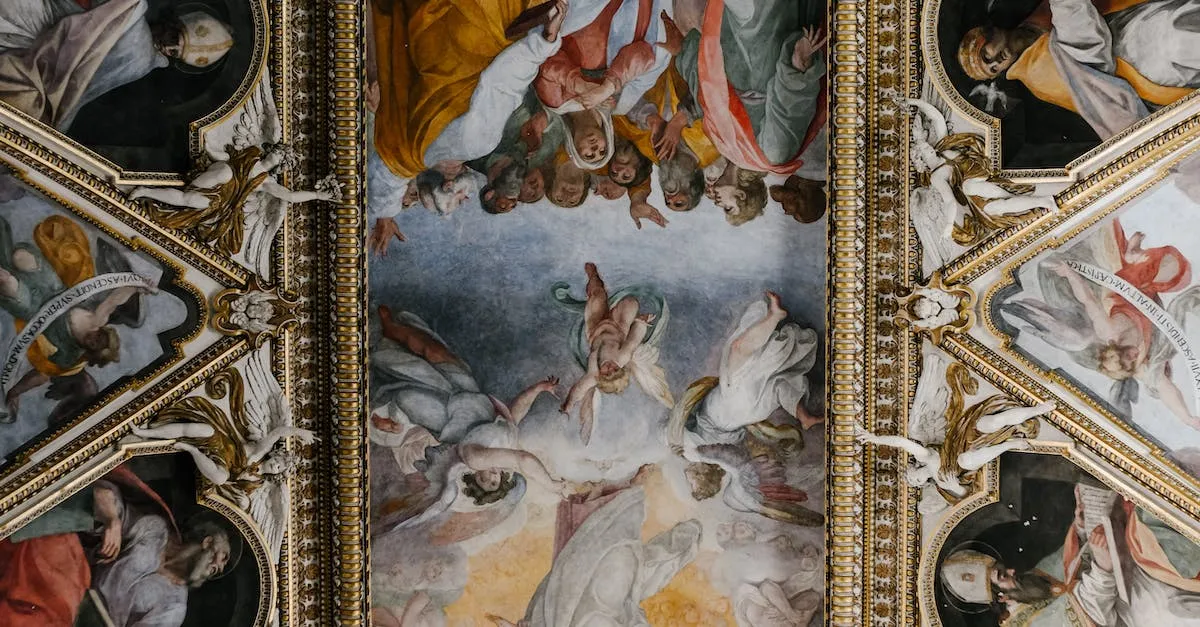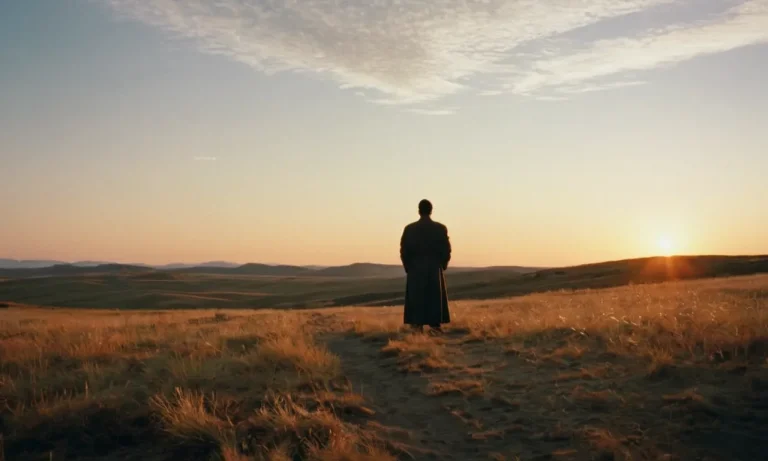Born Again Christian vs Catholic: Key Differences Explained
Christianity has various denominations with differing beliefs and practices. Two of the largest groups are born-again Christians and Catholics. If you’re wondering about the differences between these two, you’ve come to the right place.
But there’s more nuance than that simple summary, so read on as we explore the key theological and practical differences between born-again Christians and Catholics.
Different Views on Salvation and Grace
When it comes to the concept of salvation and grace, Born Again Christians and Catholics have different perspectives. These differences can be attributed to variations in their theological beliefs and interpretations of the Bible.
Born Again Christians Believe Salvation is by Faith Alone
Born Again Christians place a strong emphasis on the belief that salvation is obtained solely through faith in Jesus Christ.
They believe that accepting Jesus as their personal savior and having a personal relationship with Him is the only way to attain salvation.
This viewpoint is rooted in the belief that humans are inherently sinful and salvation can only be achieved through God’s grace and not by any human effort.
This transformative experience is often referred to as being “born again” or “born anew.” It is believed that through this process, believers receive God’s forgiveness and are granted eternal life.
And this is not your own doing; it is the gift of God, not a result of works, so that no one may boast.”
Catholics Believe Faith and Works are Needed for Salvation
On the other hand, Catholics believe that faith and works are both essential for salvation. While they acknowledge the importance of faith, they also emphasize the significance of good works and living a righteous life.
Catholics believe that salvation is a process that involves both God’s grace and human cooperation.
According to Catholic teachings, individuals are justified by God’s grace, which is received through the sacraments, especially baptism.
However, this grace must be nurtured and strengthened through acts of charity, obedience to God’s commandments, and participation in the sacraments.
It is believed that these works, done in cooperation with God’s grace, contribute to the process of salvation.
The Catholic Church teaches that faith without works is dead, as mentioned in James 2:14-17, which states, “What good is it, my brothers and sisters, if someone claims to have faith but has no deeds?
Can such faith save them?… Faith by itself, if it is not accompanied by action, is dead.”
It is important to note that while there are differences in the views on salvation and grace, both Born Again Christians and Catholics share a common belief in the importance of Jesus Christ as the ultimate source of salvation and grace.
Authority Vested in Scripture vs Church Tradition
When it comes to the authority vested in scripture versus church tradition, there are key differences between born again Christians and Catholics.
Both groups hold their beliefs and practices to be deeply important, but they approach the source of authority in different ways.
Born Again Christians See the Bible as the Sole Source of Authority
Born again Christians, also known as Evangelical Christians, place a strong emphasis on the authority of the Bible. They believe that the Bible is the inspired word of God and the sole source of truth and guidance for their faith.
They see scripture as the ultimate authority and believe that it is sufficient for all matters of faith and practice.
For born again Christians, the Bible is seen as a comprehensive and complete guide to salvation and living a Christian life.
They believe that every word in the Bible is divinely inspired and without error. This belief leads them to prioritize the study and interpretation of scripture above all else.
They often engage in personal Bible study, attend Bible study groups, and rely on the teachings of pastors who have studied and preached from the Bible.
The goal is to understand and apply the principles and teachings found in the scriptures to their daily lives.
Catholics Also Follow Sacred Tradition and Teachings of the Magisterium
On the other hand, Catholics believe in the authority of scripture, but they also place importance on sacred tradition and the teachings of the Magisterium, which is the official teaching authority of the Catholic Church.
Catholics believe that the Bible is the inspired word of God, but they also recognize the importance of the oral tradition that has been passed down through the centuries.
They believe that Jesus entrusted his teachings not only to the written word but also to the apostles and their successors, who have preserved and interpreted this tradition.
In addition to scripture, Catholics rely on the teachings of the Magisterium, which consists of the Pope and the bishops in communion with him.
The Magisterium is responsible for authoritatively interpreting scripture and preserving the teachings of the Church.
The teachings of the Magisterium, along with sacred tradition, provide Catholics with a comprehensive understanding of their faith. They believe that the authority of the church is necessary to properly interpret and apply scripture in the modern world.

Importance of Sacraments
The sacraments play a central role in the Christian faith, serving as visible signs of God’s grace and a means through which believers can experience a deeper connection with Him.
While both Born Again Christians and Catholics recognize the importance of sacraments, there are significant differences in how they approach and observe them.
Born Again Christians Only Observe Baptism and Communion
For Born Again Christians, the sacraments of baptism and communion hold great significance. Baptism is seen as a public declaration of one’s faith and a symbol of being cleansed from sin and born anew in Christ.
It is typically performed through full immersion in water, symbolizing a spiritual rebirth. Communion, also known as the Lord’s Supper or the Eucharist, is a commemoration of the Last Supper of Jesus Christ and represents the sharing of His body and blood.
This sacrament is usually observed regularly in church services and is a way for believers to remember Christ’s sacrifice and affirm their faith.
Catholics Have Seven Sacraments
In contrast to Born Again Christians, Catholics believe in the seven sacraments, each serving a specific purpose in the spiritual journey of believers.
These sacraments are baptism, confirmation, Holy Eucharist, reconciliation, anointing of the sick, Holy Orders, and matrimony.
Each sacrament is seen as a conduit of God’s grace and has its own rituals and significance in Catholic doctrine.
For example, confirmation is a sacrament where individuals receive the Holy Spirit and are strengthened in their faith, while the anointing of the sick is a sacrament of healing and comfort for those who are ill.
It is important to note that while both Born Again Christians and Catholics value sacraments, their beliefs and practices around them differ.
Born Again Christians tend to focus on the symbolic nature of baptism and communion, while Catholics view sacraments as channels of God’s grace that are necessary for salvation.
Understanding these differences can lead to greater appreciation and respect for each other’s faith traditions.
Veneration of Mary and the Saints
Born Again Christians Do Not Pray to Saints
One of the key differences between born again Christians and Catholics is their approach to the veneration of Mary and the saints. Born again Christians do not pray to saints.
They believe in the direct connection between themselves and God through Jesus Christ, and therefore, they do not see the need to seek intercession from saints.
Instead, they emphasize a personal relationship with God and believe in praying directly to Him for guidance, help, and forgiveness.
Catholics Venerate and Pray to Mary and Saints
On the other hand, Catholics venerate and pray to Mary and saints. They believe that these holy figures can intercede on their behalf and bring their prayers to God. Catholics see Mary as the Mother of God and the most powerful intercessor after Jesus.
They believe that by praying to Mary and the saints, they can gain their favor and receive their intercession in times of need.
It is important to note that while born again Christians do not pray to saints, they do hold a deep respect for Mary as the mother of Jesus.
They acknowledge her role in the birth of Jesus and her faithfulness to God. However, they do not believe in praying to her or seeking her intercession.
It is also worth mentioning that there are variations within both the born again Christian and Catholic denominations regarding the veneration of Mary and the saints.
Some born again Christians may have a more tolerant view towards the veneration of saints, while some Catholics may choose to focus more on their personal relationship with God.
To learn more about the differences between born again Christians and Catholics, you can visit www.catholic.com and www.gotquestions.org.
Social Issues and Moral Teachings
Social issues and moral teachings are important aspects of religious beliefs and practices. Both Born Again Christians and Catholics have specific views on various social issues and moral teachings, although there may be some differences between the two.
Born Again Christians Have a Range of Views
Born Again Christians often have a wide range of views on social issues and moral teachings. As individual believers, they may interpret the Bible differently and hold varying opinions on topics such as abortion, same-sex marriage, and gender roles.
While some Born Again Christians may strongly oppose abortion, viewing it as the taking of innocent life, others may take a more nuanced stance, considering the circumstances and advocating for alternatives like adoption or support for pregnant mothers.
Similarly, views on same-sex marriage can vary, with some Born Again Christians believing it goes against biblical teachings, while others may emphasize love and acceptance for all individuals regardless of sexual orientation.
It is important to note that the diversity of views among Born Again Christians stems from their emphasis on personal relationship with Jesus Christ and the belief in the guidance of the Holy Spirit.
This allows for individual interpretation and understanding of social issues and moral teachings.
The Catholic Church Has Official Positions
Unlike Born Again Christians, the Catholic Church has official positions on social issues and moral teachings. The Church follows a hierarchical structure, with the Pope as the head, and issues official teachings known as doctrines and dogmas.
These teachings are based on interpretations of scripture, tradition, and the Magisterium, which is the teaching authority of the Church.
For example, the Catholic Church’s position on abortion is clear and unwavering – it considers abortion to be morally wrong and a violation of the sanctity of life. The Church teaches that life begins at conception and should be protected from that moment forward.
Similarly, the Catholic Church maintains a traditional stance on same-sex marriage, believing that marriage is a sacrament between one man and one woman.
It is important to note that while the Catholic Church has official positions, individual Catholics may hold different personal views on social issues.
However, they are expected to align their beliefs with the official teachings of the Church and follow its moral guidance.
Conclusion
While born again Christians and Catholics share core beliefs like the divinity of Jesus, they have substantive differences in doctrine and practice.
A key divergence is on salvation – born again Christians emphasize faith alone while Catholics underline good works.
Authority also comes from scripture alone for born again Christians versus tradition and Magisterium for Catholics.
From veneration of saints to sacraments to social issues, there are nuances in each tradition. Understanding these distinctions helps highlight the diversity within Christianity.








